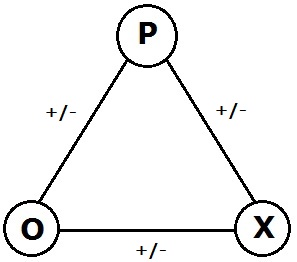|
Cognitive Inertia
Cognitive inertia is the tendency for a particular orientation in how an individual thinks about an issue, belief or strategy to resist change. In clinical and neuroscientific literature it is often defined as a lack of motivation to generate distinct cognitive processes needed to attend to a problem or issue. The physics term inertia is to emphasize the rigidity and resistance to change in the method of cognitive processing that has been in use for a significant amount of time. Commonly confused with belief perseverance, cognitive inertia is the perseverance of how one interprets information, not the perseverance of the belief itself. Cognitive inertia has been causally implicated in disregard of impending threat to one's health or environment, enduring political values and deficits in task switching. Interest in the phenomenon was largely taken up by economic and industrial psychologists to explain resistance to change in brand loyalty, group brainstorming and business strategi ... [...More Info...] [...Related Items...] OR: [Wikipedia] [Google] [Baidu] |
Orientation (mental)
Orientation is a function of the mind involving awareness of three dimensions: time, place and person. Problems with orientation lead to ''dis''orientation, and can be due to various conditions, from delirium to intoxication. Typically, disorientation is first in time, then in place and finally in person. Assessment In the context of an accident or major trauma, the Emergency Medical Responder performs spiraling (increasingly detailed) assessments which guide the critical first response. Assessment of mental orientation typically lands within the immediate top three priorities: # Safety - Assess the area safety (potential traffic, fire, overhead/underfoot objects and collapse risks, rushing water, gunfire, chemical/radiation threats, storm conditions, downed power lines, etc.), wait for the threat to subside, or move the person to safety if and when possible, all without endangering oneself. # ABCs - Note conscious or unconscious then assess Airway, Breathing and Circulation fac ... [...More Info...] [...Related Items...] OR: [Wikipedia] [Google] [Baidu] |
Rumination (psychology)
Rumination is the focused attention on the symptoms of one's distress, and on its possible causes and consequences, as opposed to its solutions, according to the ''Response Styles Theory'' proposed by Nolen-Hoeksema (1998). Because the Response Styles Theory has been empirically supported, this model of rumination is the most widely used conceptualization. Other theories, however, have proposed different definitions for rumination. For example, in the ''Goal Progress Theory'', rumination is conceptualized not as a reaction to a mood state, but as a "response to failure to progress satisfactorily towards a goal". As such, both rumination and worry are associated with anxiety and other negative emotional states; however, its measures have not been unified. Multiple tools exist to measure ruminative thoughts. Treatments specifically addressing ruminative thought patterns are still in the early stages of development. Theories Response styles theory Response styles theory (RST) ... [...More Info...] [...Related Items...] OR: [Wikipedia] [Google] [Baidu] |
Brainstorming
Brainstorming is a group creativity technique by which efforts are made to find a conclusion for a specific problem by gathering a list of ideas spontaneously contributed by its members. In other words, brainstorming is a situation where a group of people meet to generate new ideas and solutions around a specific domain of interest by removing inhibitions. People are able to think more freely and they suggest as many spontaneous new ideas as possible. All the ideas are noted down without criticism and after the brainstorming session the ideas are evaluated. The term was popularized by Alex Faickney Osborn in the classic work ''Applied Imagination'' (1953). History In 1939, advertising executive Alex F. Osborn began developing methods for creative problem-solving. He was frustrated by employees' inability to develop creative ideas individually for ad campaigns. In response, he began hosting group-thinking sessions and discovered a significant improvement in the quality and quan ... [...More Info...] [...Related Items...] OR: [Wikipedia] [Google] [Baidu] |
Political Science
Political science is the scientific study of politics. It is a social science dealing with systems of governance and power, and the analysis of political activities, political thought, political behavior, and associated constitutions and laws. Modern political science can generally be divided into the three subdisciplines of comparative politics, international relations, and political theory. Other notable subdisciplines are public policy and administration, domestic politics and government, political economy, and political methodology. Furthermore, political science is related to, and draws upon, the fields of economics, law, sociology, history, philosophy, human geography, political anthropology, and psychology. Political science is methodologically diverse and appropriates many methods originating in psychology, social research, and political philosophy. Approaches include positivism, interpretivism, rational choice theory, behaviouralism, structuralism, post-struct ... [...More Info...] [...Related Items...] OR: [Wikipedia] [Google] [Baidu] |
Climate Change Denial
Climate change denial, or global warming denial, is denial, dismissal, or doubt that contradicts the scientific consensus on climate change, including the extent to which it is caused by humans, its effects on nature and human society, or the potential of adaptation to global warming by human actions. Many who deny, dismiss, or hold doubt about the scientific consensus on anthropogenic global warming self-label as "climate change skeptics", which several scientists have noted is an inaccurate description. Climate change denial can also be implicit when individuals or social groups accept the science but fail to come to terms with it or to translate their acceptance into action. Several social science studies have analyzed these positions as forms of denial or denialism,: "There is debate over which term is most appropriate ... Those involved in challenging climate science label themselves 'skeptics' ... Yet skepticism is ... a common characteristic of scientis ... [...More Info...] [...Related Items...] OR: [Wikipedia] [Google] [Baidu] |
Spanish Flu
The 1918–1920 influenza pandemic, commonly known by the misnomer Spanish flu or as the Great Influenza epidemic, was an exceptionally deadly global influenza pandemic caused by the H1N1 influenza A virus. The earliest documented case was March 1918 in Kansas, United States, with further cases recorded in France, Germany and the United Kingdom in April. Two years later, nearly a third of the global population, or an estimated 500 million people, had been infected in four successive waves. Estimates of deaths range from 17 million to 50 million, and possibly as high as 100 million, making it one of the deadliest pandemics in history. The pandemic broke out near the end of World War I, when wartime censors suppressed bad news in the belligerent countries to maintain morale, but newspapers freely reported the outbreak in neutral Spain, creating a false impression of Spain as the epicenter and leading to the "Spanish flu" misnomer. Limited historical epidemiological ... [...More Info...] [...Related Items...] OR: [Wikipedia] [Google] [Baidu] |
Probability Theory
Probability theory is the branch of mathematics concerned with probability. Although there are several different probability interpretations, probability theory treats the concept in a rigorous mathematical manner by expressing it through a set of axioms. Typically these axioms formalise probability in terms of a probability space, which assigns a measure taking values between 0 and 1, termed the probability measure, to a set of outcomes called the sample space. Any specified subset of the sample space is called an event. Central subjects in probability theory include discrete and continuous random variables, probability distributions, and stochastic processes (which provide mathematical abstractions of non-deterministic or uncertain processes or measured quantities that may either be single occurrences or evolve over time in a random fashion). Although it is not possible to perfectly predict random events, much can be said about their behavior. Two major results in probability ... [...More Info...] [...Related Items...] OR: [Wikipedia] [Google] [Baidu] |
Cognitive Dissonance
In the field of psychology, cognitive dissonance is the perception of contradictory information, and the mental toll of it. Relevant items of information include a person's actions, feelings, ideas, beliefs, values, and things in the environment. Cognitive dissonance is typically experienced as psychological stress when persons participate in an action that goes against one or more of those things. According to this theory, when two actions or ideas are not psychologically consistent with each other, people do all in their power to change them until they become consistent. The discomfort is triggered by the person's belief clashing with new information perceived, wherein the individual tries to find a way to resolve the contradiction to reduce their discomfort.Festinger, L. (1957). ''A Theory of Cognitive Dissonance''. California: Stanford University Press. In '' When Prophecy Fails: A Social and Psychological Study of a Modern Group That Predicted the Destruction of the World'' ( ... [...More Info...] [...Related Items...] OR: [Wikipedia] [Google] [Baidu] |
Leon Festinger
Leon Festinger (8 May 1919 – 11 February 1989) was an American social psychologist who originated the theory of cognitive dissonance and social comparison theory. The rejection of the previously dominant behaviorist view of social psychology by demonstrating the inadequacy of stimulus-response conditioning accounts of human behavior is largely attributed to his theories and research. Festinger is also credited with advancing the use of laboratory experimentation in social psychology, although he simultaneously stressed the importance of studying real-life situations, a principle he practiced when personally infiltrating a doomsday cult. He is also known in social network theory for the proximity effect (or propinquity). Festinger studied psychology under Kurt Lewin, an important figure in modern social psychology, at the University of Iowa, graduating in 1941; however, he did not develop an interest in social psychology until after joining the faculty at Lewin's Research Cente ... [...More Info...] [...Related Items...] OR: [Wikipedia] [Google] [Baidu] |
Balance Theory
In the psychology of motivation, balance theory is a theory of attitude change, proposed by Fritz Heider. It conceptualizes the cognitive consistency motive as a drive toward psychological balance. The consistency motive is the urge to maintain one's values and beliefs over time. Heider proposed that "sentiment" or liking relationships are balanced if the affect valence in a system multiplies out to a positive result. Structural balance theory in social network analysis is the extension proposed by Frank Harary and Dorwin Cartwright. It was the framework for the discussion at a Dartmouth College symposium in September 1975. P-O-X model For example: a Person (P) who likes (+) an Other (O) person will be balanced by the same valence attitude on behalf of the other. Symbolically, P (+) > O and P X * P (-) > O * O (+) > X Cognitive balance is achieved when there are three positive links or two negatives with one positive. Two positive links and one negative like the example a ... [...More Info...] [...Related Items...] OR: [Wikipedia] [Google] [Baidu] |
Fritz Heider
Fritz Heider (19 February 1896 – 2 January 1988) was an Austrian psychologist whose work was related to the Gestalt school. In 1958 he published ''The Psychology of Interpersonal Relations'', which expanded upon his creations of balance theory and attribution theory. This book presents a wide-range analysis of the conceptual framework and the psychological processes that influence human social perception (Malle, 2008). It had taken 15 years to complete; before it was completed it had already circulated through a small group of social psychologists. Biography Heider was born in Vienna, Austria on February 19, 1896 but he grew up in Graz. His family was Jewish. During his childhood, Heider sustained a serious eye injury which later turned him quite serious and shy in his adolescence. Because of his injury, Heider avoided the draft during World War I. With his father’s encouragement, Heider enrolled to study architecture at the University of Graz. After growing tired of studyin ... [...More Info...] [...Related Items...] OR: [Wikipedia] [Google] [Baidu] |
Cognitive Psychology
Cognitive psychology is the scientific study of mental processes such as attention, language use, memory, perception, problem solving, creativity, and reasoning. Cognitive psychology originated in the 1960s in a break from behaviorism, which held from the 1920s to 1950s that unobservable mental processes were outside the realm of empirical science. This break came as researchers in linguistics and cybernetics, as well as applied psychology, used models of mental processing to explain human behavior. Work derived from cognitive psychology was integrated into other branches of psychology and various other modern disciplines like cognitive science, linguistics, and economics. The domain of cognitive psychology overlaps with that of cognitive science, which takes a more interdisciplinary approach and includes studies of non-human subjects and artificial intelligence. History Philosophically, ruminations on the human mind and its processes have been around since the times of the a ... [...More Info...] [...Related Items...] OR: [Wikipedia] [Google] [Baidu] |

.jpg)



